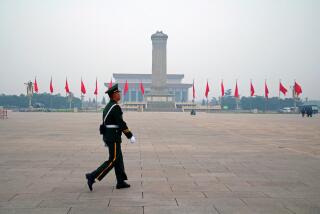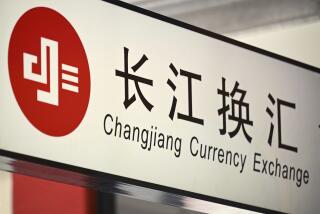AS--RioTinto-Arrests
- Share via
SHANGHAI -- — China formally arrested four employees of mining giant Rio Tinto Ltd. on suspicion of infringing trade secrets and bribery, but stopped short of filing politically explosive espionage charges in a case that has strained ties with key trading partner Australia.
Investigations showed the four, including Stern Hu, an Australian citizen who headed Rio Tinto’s iron ore business in China, obtained commercial secrets about China’s steel and iron industries through “improper means” and were involved in bribery, the official Xinhua News Agency reported Wednesday.
Rio Tinto and the Australian government appealed to Beijing to allow Hu legal representation and to handle the case in a transparent manner.
“Rio Tinto will strongly support its employees in defending these allegations,” Sam Walsh, the company’s iron ore chief executive, said in a written statement. “From all the information available to us, we continue to believe that our employees have acted properly and ethically in their business dealings in China.”
Walsh appealed for a “transparent legal process.”
News of the arrests also was reported on the website of the China Procuratorial Daily, which is run by the Supreme People’s Procuratorate -- China’s top prosecutorial organ. The reports made no mention of earlier, more serious accusations of stealing state secrets, which China’s state-controlled media had said the four would face.
Hu and three Chinese nationals working for the miner were detained July 5 amid contentious ore price talks with Chinese steel mills.
The earlier Chinese media reports accused Hu of paying bribes in exchange for information on China’s negotiating stance in those talks. Some reports said Hu’s actions amounted to stealing state secrets, and a Chinese diplomat said in July that China had told Australia it had “ample evidence” that Hu and his three co-workers stole state secrets.
Xinhua said Chinese prosecutors had found evidence of bribery. It said some individuals in Chinese steel and iron companies were suspected of providing the Rio employees with commercial secrets, but it gave no specific details.
Australia is a key supplier of iron ore and other resources for China’s fast-growing economy, and the case has added to friction after Rio Tinto’s decision in June to drop a $19.5-billion deal with state-controlled Aluminum Corp. of China. Chinalco, as the Chinese company is better known, later subscribed to a $15.2-billion share issue to maintain a 9% stake in Rio Tinto.
The Australian side has expressed concern over the handling of the case and worries that Chinese-born Hu may not receive a fair trial.
China’s deputy commerce minister rebuffed those fears.
“We believe Chinese judicial organs will make a fair ruling on the case based on the facts and in accordance with law. There is no question about that,” Fu Ziying said at a news conference Wednesday.
Fu said the case was an isolated incident that reflects the government’s determination to create a competitive, open and fair market environment in China.
“This will not hurt China’s efforts in terms of attracting foreign direct investment,” Fu said.
More to Read
Sign up for Essential California
The most important California stories and recommendations in your inbox every morning.
You may occasionally receive promotional content from the Los Angeles Times.













